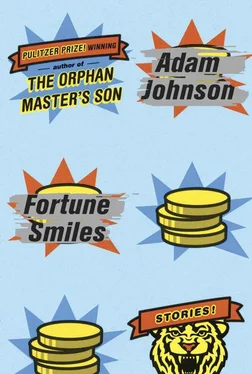First there’s a text message from his girlfriend, Relle: “411+XXX.”
Then there’s a voicemail from his boss about a utility crew. Delivering to the utility crews is the biggest pain in the ass — they’re in a different place every day, lost themselves half the time. They’re all from Nebraska and Arkansas, and since they signed up to go save New Orleans after Hurricane Katrina, they’re none too happy about getting stuck in Lake Charles after Hurricane Rita.
Finally, there’s a message from a doctor in Los Angeles about his father. Nonc’s old man is a garden-variety scoundrel, and on the scale of bad dads, he probably only rates a medium, but because of his ability to write vicious and unrelenting Post-it notes, he was one of the most avoided characters in Lake Charles right up to the day he stole Nonc’s car and left town. Nonc’s father can’t speak, so once or twice a year Nonc gets a call from somebody who’s been suckered into the task of reading a stream of Post-its.
The doctor’s text message is this: “Your father is very ill and not expected.”
Nonc’s dad has had cancer before, so the diagnosis isn’t exactly news. There’s something right about it, though. A man spends his life “not expected”—isn’t that how it should end?
Nonc steps up on one of the kiddie rides, a paddy wagon driven by a singing rat. From this height, he can see the evacuees are all wearing orange FEMA bracelets and the same cheap-ass white sneakers. Eating pizza all day, watching TV. It’s true these folks had it bad — got hit by Katrina, then evacuated to Lake Charles, only to get hit by Rita three weeks later. But Rita has passed, and it’s high time to get their shit tight. Someone needs to tell them that they’re better off without their coffee tables and photo albums. Some person will have to break it to them that their apartments weren’t so great, that losing track of half their relatives is probably for the best. Some shit, though, you got to figure for yourself.
Nonc lifts a hand. “Does anybody know Marnie Broussard?” he asks them yet again. “She’s a white girl, from Tremé in New Orleans. She’s the mother of my boy.”
—
Soon Nonc’s UPS van is grinding toward the top of the Lake Charles Bridge. The bridge cuts the city in two, and it has this weird way of making you forget. Nonc goes over it like ten times a day — parts for the petrochemical plants, drops at the riverboat casinos, a million foam coolers of crawfish to the airport — though he never really thought about the power of the bridge till the hurricanes came. This morning, Nonc delivered sausage casings to the hog lots in Lacassine and Taser batteries to the Calcasieu jail, but once he starts climbing the bridge — suddenly there’s no more pig squeal in his ears, and his clothes don’t stink of louse powder and prison okra. There’s just the clean smell of rice barges, oyster shale in the sun, and that sandwich spread of ocean, twenty miles south.
For the bridge to work, there’s only one thing you got to not think about, and that’s how this lady from New Orleans tossed her kids off last week. She lined those tots up for the old heave-ho, and when the deed was done and it was her turn to splash, she chickened. The bridge is no stranger to jumpers, and Nonc has driven past exhaust-blackened wreaths and we miss you so-and-so messages spray-painted down the guardrail. What gets Nonc is that, in his experience, parents abandon you slowly, bit by bit, across your entire youth. Even after you get over being ditched, they keep calling to remind you. So the thought of casting off your children in one stroke is unnerving and new, and Nonc knows exactly how it will play out: they’ll blame the hurricane and put that lady in a halfway house for a year — then she’ll move to Vegas or something and live on dollar-ninety-nine prime rib.
Nonc coasts down the backside of the bridge before turning onto Lake Street, where the fat homes are, with their long docks and boathouses. Because the rich folks are still poshing it up wherever rich folks evacuate to, this is the last section of town to get service restored. Sections from downed oak trees have been rolled like old tires in the ditch, and Nonc’s van lumbers over sprays of brick from fallen chimneys, making Geronimo’s yellow boom box skip.
“Grow-grow,” the boy shouts.
“Easy there, hot rod,” Nonc says, forwarding through the CD tracks — there’s Ernie and Bert singing “Elbow Room,” and then there’s “Batty-Bat,” which the Dracula puppet does. He turns it up when Grover starts rapping the ABCs.
It took him a week to figure out the boy was trying to say Grover .
Nonc’s had “custody” of him since the day after Katrina. New Orleans was being evacuated, buses coming in by the caravan, and the city was already overrun with tuffdicks from the offshore rigs. Nonc was making a FEMA delivery — which meant wading into a casino parking lot filled with thousands of people, looking for anyone wearing a tie. He emerged to find Geronimo in his van with a yellow boom box and a bag of clothes.
Marnie didn’t even leave a note. Do you brush a toddler’s teeth? What do you do when a boy stays awake all night, staring at the roof of the van? Nonc would give anything for a vocabulary sheet. What does bway mean? And the initials M-O ? So far, Nonc’s figured out a couple dozen words— back, bed, mess, broke —things like that. Gla-gla is chocolate milk. When Geronimo needs help, he says up, up . And then there’s eyeball, which he says clear as a bell — why, what the hell for?
Relle taught the boy hug and kiss . You can say, “Baby kiss van,” and though you can tell he doesn’t want to, he’ll go like a robot and put his lips on the dusty fender. Relle is always saying, “Baby hug chair” and it kills her, it’s so cute. Geronimo goes into this seek-and-destroy mode, and the next thing you know, he’s gotten to third base with the nearest barstool. And it was Relle’s idea that the boy should call him Nonc, rather than Randall, his real name.
Nonc and Relle call him rascal, G, G-Ron, Nimo, things like that, because he can’t understand his full name, let alone say it. That should tell you what kind of guy Nonc was back when Marnie told him she was pregnant. “Geronimo,” he said in that fuck-it way, like someone jumping from a plane. He didn’t say it in a birth-certificate way, at least he thinks he didn’t. Marnie moved to New Orleans, had the boy there, and once she figured out how to garnish Nonc’s wages, there wasn’t much need to talk. Yet here they are, one mean delivery team — Nonc belted the boy’s high chair to the jump seat, and the changing station folds down from the rear doors. So Nonc’s surviving, it’s been five weeks already, and Marnie’s vacation from parenthood can’t last forever. Hurricane or no, there are only so many places to hide in Lake Charles.
The utility crews have cut a primitive path down Lake Street. The shrubs have been trimmed by sheets of flying glass, and the trees are shot through with the cotton candy of insulation. The weird thing isn’t the destruction — you expect to see the corpselike bloat of swamped mattresses or refrigerators that have exploded. What’s unnerving is the way clothes hang in the limbs of trees, making it look, out of the corner of your eye, like folks are up there watching you. It’s spooky the way, instead of seeing yourself in the windows of passing houses, your reflection falls into their dark rooms.
Up ahead are a few City of Tulsa trucks and a command van. Some linemen are working their way down the street in a halo of sawdust and two-stroke smoke, while the electricians, T-shirts on their heads, sit in fold-up fishing chairs in the shade of a sailboat on its side. You can tell these guys have been living out of their rigs — milk crates of rations are everywhere, half-washed clothes flap from the outriggers of a boom truck. They’re probably scavenging new frying pans every time one gets dirty, and crapping in five-gallon buckets. It’s easy to live out of your vehicle, though. Once you accept your situation, your shit gets tight real quick.
Читать дальше












